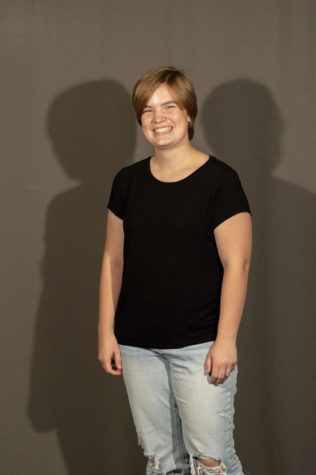Tale of three cities

November 21, 2017
Bethany Robinson never expected a simple selfie to get her into trouble.
“Ms. Robinson took out her selfie stick (a common contraption of the time) and took a selfie of our group,” Trevor Zavac said. “Immediately, an usher came and yelled at her. ‘Put that away. No pictures here. Where is your chaperone?’ He had thought that Ms. Robinson was a student.” This favorite memory of Zavac’s was born out of a jazz band trip to the Chicago Symphony Orchestra, but instead of the soothing cellos and shrill violins, it was a battle of the bands between the Jazz at Lincoln Center and The Count Basie Orchestra.
Bethany Robinson, jazz teacher, traveler of the world, and wicked good bass player is continuing to make her mark, not only at NHS and among the students, but around the world as she traverses the jazz communities of the world.
“[Robinson] is an extremely kind person who is very laid back,” Zavac said. “She is a believer in trying. She tries to expose us to every aspect of jazz, constantly teaching us about jazz through her own experiences.”
Robinson grew up in Kokomo, where she says she found her love for music and learned to play piano, flute, and bass guitar. Robinson earned her B.S. in Musical Education in 2004 from Olivet Nazarene University, and later returned to earn her Master’s Degree in Education in 2011.
She landed a teaching career at Noblesville High School in 2005, and that same year Robinson was joined by current concert band and marching band director, Eric Thornbury.
Together, Robinson and Thornbury have worked to expand the band program at NHS.
“Through scheduling and Miss Robinson’s awesome teaching and recruitment, the jazz program has grown to five [high school] curricular jazz bands and also three middle school jazz bands,” Thornbury said. “Miss Robinson is one of the best assistant band directors I have had the opportunity to work with in my 25 years of teaching.”
Robinson’s work also extends to Noblesville’s state champion marching band, where she helped Mr.Thornbury organize the hundreds of students and parents while he directs the students in their music.
“I would say that the biggest thing she does is take care of so much of the administrative work with the marching band,” Thornbury said. “She created our handbook this past year, [which] really helped give our marching band our direction for success this year and in the future.”
Robinson’s teaching career, and her life, was changed in 2011 when she was awarded a Lilly Endowment Teacher Creativity Grant, which allowed her to travel to New York City and New Orleans.
“There’s a big grant process. Anytime you’re writing a grant you have to reread every single thing they want you to do and highlight and just be very very specific because they can throw you out on a technicality. [The grants are] such amazing gifts that you want to make sure that you’re doing everything you’re supposed to do to get them,” Robinson said.
The coveted gift of the grant would later give her an unexpected gift of its own; during her visit to New York City, Robinson met Jeremy Greig, a professor of Western Australia Academy of Performing Arts, and was later off on another adventure. This time, to Perth, Australia.
“The objectives were to visit four or five really outstanding music schools there that have completely changed their curriculum for jazz and how they do it and how they rehearse [and] what parts of the day they have [class] and how they audition,” Robinson said.
Before exploring Australia’s cream-of-the-crop of music schools, Robinson judged at the 2017 Western Australian Schools’ Jazz Festival.
“I judged 31 bands back-to-back-to-back in one day. That was the second day I was there. I got there in the late afternoon on a Friday, and then [Sunday] I was talking on a recording all day and giving them feedback and trying to be positive and encourage them,” Robinson said.
Throughout her travels Robinson has not only made connections with the locals of New York City, New Orleans, and people from distant countries, she has also discovered new ways to teach.
“Every time I see someone else teaching music, I always pick up new things. I always think ‘I’ve got to take that back to Noblesville.’
Her visits to New York and New Orleans were thrilling rewards after months of hard work.
“I explored everything jazz possible, and it was a transformative experience,” Robinson said.
For Robinson, both New Orleans and New York City have cast their spell upon her, bringing her back again and again.
“[In New Orleans] you’re going to see brass bands on the street corners, and young people just playing music and collecting money in a hat, or in a guitar case. It feels like it comes from the soul a lot more, in some ways, and then in New York City it’s a lot more formal, and there’s a lot of different jazz clubs,” Robinson said.
Many people say that New York is a whole different ball game than any other city. People go there for the neon signs of Times Square, their favorite shows on the big stage, or maybe just for the legendary food. And they are not often disappointed.
“Really famous people go through [New York] as well. The energy there is so tangible, you can really feel it. [There’s always something going on] always, 24 hours a day,” Robinson said.
More common than celebrities are the common citizens of New York City.
“I met a lot of people there, which I didn’t really expect to. I just thought I’d see things and shows and music, and what I ended up meeting were just some people who lived in these places, and just struck up a friendship,” Robinson said.
But it is not simply the music that keeps dragging Robinson back to the big cities; it is the people as well.
“[What is most encouraging to me] is anytime that you stop and you actually hear somebody else’s story. Meeting people from Australia and cab drivers in New Orleans or a bellhop in New Orleans or musicians in NYC, anytime you sit down and you have a conversation with someone and you kinda get down to what’s important in life. You just find out that you have so much in common with people who have completely different lives,” Robinson said.
“Anytime you had these conversations you find out that people want to belong, they want a purpose, and it doesn’t matter what even political affiliation you are you find so much [as having] common ground with people that you’re able to kind of think about things in more global ways, or in bigger ways, bigger than yourself,” Robinson said. “So I think that traveling for me does more to help my perspective as much about humanity as it does as my perspective on music.”



